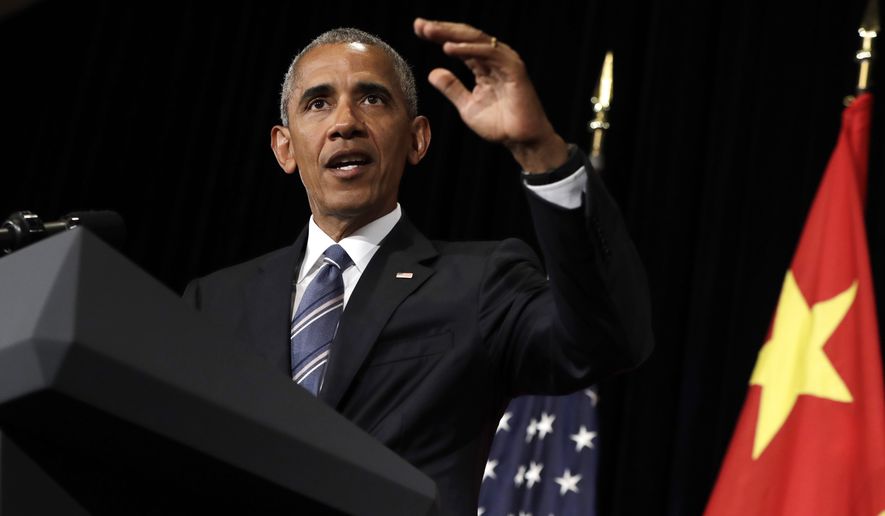Despite evidence of Russian hacking into the U.S. election system, President Obama said Monday that he doesn’t want to escalate into a “wild, wild West” cyberwar with Moscow.
Emerging from a 90-minute meeting with Russian President Vladimir Putin in China, Mr. Obama acknowledged that the Russians have been attacking U.S. institutions on the internet.
“We’ve had problems with cyberintrusions from Russia in the past, from other countries in the past,” Mr. Obama said.
But he suggested that he didn’t want to retaliate.
“Our goal is not to suddenly in the cyber arena duplicate a cycle of escalation that we saw when it comes to other arms races in the past, but rather to start instituting some norms so that everybody’s acting responsibly,” Mr. Obama said. “What we cannot do is have a situation in which suddenly this becomes the wild, wild West, where countries that have significant cybercapacity start engaging in unhealthy competition or conflict through these means.”
U.S. officials said last week that election systems in Illinois and Arizona had been hacked and that Russia was most likely responsible. Russian hackers also have been blamed for intrusions into records of the Democratic National Committee and the House Democrats’ campaign organization.
Russia denies that it has carried out any cyberattacks in the U.S. Mr. Putin called the accusations against Russia by U.S. officials an attempt to “distract the public’s attention.”
“At the state level, we certainly weren’t involved in this,” Mr. Putin said.
But the Russian leader said the release of information hacked from the DNC was a benefit.
“It doesn’t really matter who hacked this data from Mrs. Clinton’s campaign headquarters,” Mr. Putin said, referring to Democratic presidential nominee Hillary Clinton, in an interview with Bloomberg News. “The important thing is the content was given to the public.”
The hacking of the DNC material showed an apparent bias among top party officials against Mrs. Clinton’s top challenger for the presidential nomination, Sen. Bernard Sanders.
Mr. Obama said cyberwarfare was “a topic of conversation with President Putin, as it has been with other countries.” But he said he didn’t want to take part in a cyberspace arms race.
“We’re going to have enough problems in the cyberspace with non-state actors who are engaging in theft and using the internet for all kinds of illicit practices,” Mr. Obama said, adding that he pushed for foreign governments to adopt “norms” for online activity. “We’ve started to get some willingness on the part of countries … to adopt these norms, but we’ve got to make sure we’re observing them.”
The president said the U.S. has the ability to wreak havoc on the internet if Washington so desired.
“We’re moving into a new era here where a number of countries have significant capacities,” he said. “And, frankly, we got more capacity than anybody both offensively and defensively.”
The Department of Homeland Security is offering local and state election officials help to ward off cyberattacks and access to other tools for improving cybersecurity. Homeland Security Secretary Jeh Johnson said he wants to include election systems as “critical infrastructure” that would qualify for oversight, raising fears of federal government control of the nation’s 9,000-plus state and local election jurisdictions.
The FBI issued a “flash alert” last month urging state election officials to beware of cyberintrusions and to upgrade security in election systems.
The president’s relatively mild tone on the suspected Russian hacking also allowed Mrs. Clinton to sound tougher on the issue. In a campaign speech last week, the Democratic presidential nominee pledged, if elected, to “make it clear that the United States will treat cyberattacks just like any other attack.”
“We will be ready with serious political, economic and military responses,” she said. “We are going to invest in protecting our governmental networks and our national infrastructure. I want us to lead the world in setting the rules in cyberspace. If America doesn’t, others will.”
Mrs. Clinton referred to several examples of hacking, including the suspected Kremlin-linked attacks on the DNC.
“We need to respond to evolving threats from states like Russia, China, Iran and North Korea,” Mrs. Clinton said. “We need a military that is ready and agile so it can meet the full range of threats and operate on short notice across every domain — not just land, sea, air and space, but also cyberspace.”
• Dave Boyer can be reached at dboyer@washingtontimes.com.




Please read our comment policy before commenting.